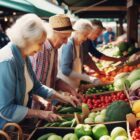Why Should Seniors Apply for Nutritional Assistance?

Do you want to ensure that your loved ones are well-nourished and healthy in their golden years?
By applying for nutritional assistance, seniors can gain access to a wide range of benefits. These programs offer support for managing chronic health conditions and increased social engagement.
From improved access to nutritious food to financial relief for those on limited incomes, these programs offer support for managing chronic health conditions and increased social engagement.
Discover why seniors should take advantage of these opportunities to enhance their physical and mental well-being.
Key Takeaways
- Nutritional assistance programs provide support for seniors in accessing nutritious food, overcoming barriers such as limited income and mobility issues.
- Good nutrition is crucial for maintaining physical and mental well-being in older adults, and nutritional assistance programs bridge the gap in obtaining necessary nutrients.
- These programs offer financial relief for seniors on limited incomes, reducing grocery expenses and allowing them to prioritize other essential needs.
- Nutritional assistance programs also offer support for managing chronic health conditions, providing balanced meals that meet dietary guidelines and aid in disease management.
Improved Access to Nutritious Food
Improve your access to nutritious food by applying for nutritional assistance as a senior. Access to nutritious food is essential for maintaining good health and well-being. As we age, our nutritional needs change, and it becomes even more crucial to ensure we’re getting the right nutrients to support our bodies. Unfortunately, many seniors face challenges in accessing nutritious food due to factors such as limited income, mobility issues, and lack of transportation.
Nutritional assistance programs, such as the Supplemental Nutrition Assistance Program (SNAP) and the Senior Farmers’ Market Nutrition Program (SFMNP), can help seniors overcome these barriers and improve their access to nutritious food. SNAP provides eligible seniors with financial assistance to purchase groceries, including fruits, vegetables, and whole grains. SFMNP allows seniors to obtain fresh, locally grown produce from farmers’ markets, promoting both nutrition and community engagement.
By applying for nutritional assistance, seniors can ensure they’ve a reliable source of healthy food. This can lead to enhanced physical and mental well-being, as proper nutrition is linked to reduced risk of chronic diseases, improved cognitive function, and increased energy levels.
Don’t let limited resources hinder your ability to eat well. Take advantage of nutritional assistance programs and improve your access to nutritious food for a healthier and happier life.
Enhanced Physical and Mental Well-Being
Boost your overall well-being by ensuring you have access to nutritious food through nutritional assistance programs as a senior. The link between good nutrition and physical and mental well-being in older adults is well-established. Proper nutrition plays a crucial role in maintaining a healthy body weight, reducing the risk of chronic diseases such as heart disease, diabetes, and osteoporosis, and supporting optimal cognitive function.
As we age, our bodies undergo various changes that can impact our nutritional needs. For example, older adults may experience a decrease in appetite, changes in taste and smell, and difficulty chewing or swallowing. These factors can make it challenging to obtain the necessary nutrients from food alone. Nutritional assistance programs can help bridge this gap by providing access to healthy and nourishing meals.
Research has shown that seniors who receive nutritional assistance experience improved physical health outcomes, including a lower risk of malnutrition and a reduced likelihood of developing chronic diseases. Furthermore, a well-balanced diet has been linked to enhanced cognitive function, improved mood, and a lower risk of mental health disorders such as depression and anxiety.
By prioritizing access to nutritious food through nutritional assistance programs, you can enhance your physical and mental well-being as a senior. This, in turn, can contribute to a better quality of life and increased longevity. In addition to the health benefits, ensuring proper nutrition can also help reduce healthcare costs associated with preventable illnesses.
Transition: Alongside the physical and mental benefits, nutritional assistance programs can also provide financial relief for seniors on limited incomes.
Financial Relief for Seniors on Limited Incomes
Save money and alleviate financial strain by applying for nutritional assistance programs if you’re a senior on a limited income. These programs are designed to provide financial relief and ensure that seniors have access to nutritious meals. Here are some ways in which nutritional assistance can help:
- Reduced Grocery Expenses: Nutritional assistance programs, such as the Supplemental Nutrition Assistance Program (SNAP), provide eligible seniors with benefits to purchase food. This can significantly reduce your grocery expenses, freeing up money for other essential needs.
- Access to Fresh and Healthy Food: Many seniors on limited incomes struggle to afford fresh fruits, vegetables, and other nutritious foods. Nutritional assistance programs can help you access a wider variety of healthy food options, ensuring that you maintain a balanced diet.
By taking advantage of these programs, you can stretch your budget, maintain a healthy diet, and improve your overall well-being. With the financial relief provided by nutritional assistance, you can better manage your limited income and prioritize other essential expenses, such as medication and healthcare costs.
Transitioning into the next section, let’s explore the support available for managing chronic health conditions.
Support for Managing Chronic Health Conditions
Take control of your chronic health conditions with the support provided through nutritional assistance programs. These programs not only help address food insecurity among seniors, but also offer specific benefits for managing chronic health conditions. By accessing nutritious meals, you can improve your overall health and better manage conditions such as diabetes, hypertension, and heart disease.
One key aspect of nutritional assistance programs is the focus on providing balanced meals that meet dietary guidelines. These meals are designed to support optimal health and provide essential nutrients. For example, the Supplemental Nutrition Assistance Program (SNAP) allows you to purchase fresh fruits, vegetables, whole grains, and lean proteins, which are all important components of a healthy diet.
Furthermore, some nutritional assistance programs offer specialized support for individuals with specific health conditions. For instance, the Congregate Nutrition Program provides meals tailored to the needs of seniors with diabetes. These meals have controlled carbohydrate content and help maintain blood sugar levels.
To highlight the benefits of nutritional assistance for managing chronic health conditions, consider the following table:
| Nutritional Assistance Program | Benefits for Chronic Health Conditions |
|---|---|
| SNAP | Access to nutritious foods for overall health improvement |
| Congregate Nutrition Program | Specialized meals for seniors with diabetes, supporting blood sugar control |
| Meals on Wheels | Nutritious meals for seniors with limited mobility, aiding in disease management |
Increased Social Engagement and Community Support
Participating in nutritional assistance programs can foster a sense of belonging and provide vital community support for seniors. These programs not only address the nutritional needs of seniors but also offer opportunities for increased social engagement and connection to their community.
Here are some ways in which seniors can benefit from the increased social engagement and community support provided by these programs:
- Social connections: By participating in nutritional assistance programs, seniors have the chance to meet and interact with other individuals in similar circumstances. These programs often organize group activities, such as cooking classes or community meals, which provide opportunities for seniors to socialize and build meaningful relationships.
- Volunteer opportunities: Many nutritional assistance programs rely on volunteers to help distribute meals or organize events. Seniors who participate in these programs can not only receive support but also contribute to their community by volunteering their time and skills. This sense of purpose and contribution can have a positive impact on seniors’ overall well-being.
Frequently Asked Questions
What Are the Eligibility Criteria for Seniors to Apply for Nutritional Assistance?
To apply for nutritional assistance as a senior, you need to meet certain eligibility criteria. These criteria are based on factors like age, income, and household size. Meeting these requirements can help ensure you receive the support you need.
Are There Any Limitations on the Types of Food That Can Be Purchased With Nutritional Assistance Benefits?
Yes, there are limitations on the types of food that can be purchased with nutritional assistance benefits. These limitations ensure that the assistance is used for nutritious and healthy food options.
How Can Seniors Apply for Nutritional Assistance Programs?
To apply for nutritional assistance programs, seniors can start by contacting their local Department of Social Services or visiting their website. They will guide you through the application process and provide information on eligibility criteria and required documentation.
What Additional Support Services Are Available to Seniors Who Receive Nutritional Assistance?
Additional support services available to seniors who receive nutritional assistance include access to nutrition education programs, assistance with meal planning, and referrals to other community resources such as transportation services and home-delivered meals.
Are There Any Time Limits or Restrictions on How Long Seniors Can Receive Nutritional Assistance Benefits?
There are no time limits or restrictions on how long seniors can receive nutritional assistance benefits. This means you can continue to receive the support you need for as long as you qualify.



